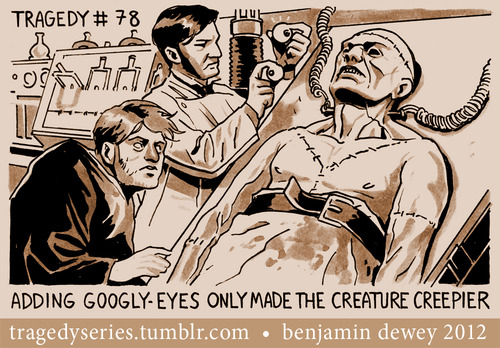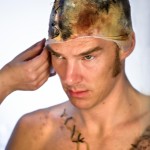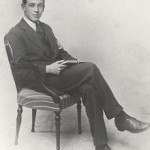Frankenstein is at least the great-uncle of the zombie story. The alternate title of Shelley’s book is The Modern Prometheus and we can’t quite decide, when it comes to necromancy, whether it’s more frightening to have Prometheus, Frankenstein, Faust and all the rest fail in their quest or succeed. Somewhere along the way, our Frankenstein’s creatures acquired a lot more hardware than the bolts in the neck. Today, Shelley’s story has more in common with HAL and cyborgs than it does with the simple reanimation of the dead.
Today’s zombie aren’t so much about hubris. Sometimes scientists have gone too far and “am playgods!” but, even when this is the case, they’re more likely to have gone wrong by wanting an evil like bioweapons, than lusting after knowledge and mastery in the wrong ways. Sometimes there’s no explanation of the cause at all; life is natural to the human form, so it’s not quite surprising when it recurs, especially if we don’t think the conservation of life requires an external Cause.
So, today’s mad scientists don’t play God by creating life. Life is abundant and dull. The frizzy-haired person in the white coat is creating intellect. We don’t animate flesh, we build AI. And here, part of the mystery is how much we can pare off and still have a human. Airplanes didn’t turn out to need flapping wings to fly; what kind of interface with the world does a rational soul need? What does it need to be human?

In the play, the Creature was intensely embodied. In an interview clip shown before the show, Benedict Cumberbatch explained that he developed the physicality of the Creature by watching footage of stroke victims in physical therapy. In the opening scenes, when he discovered his body and set about learning to use it, I was reminded of an infant, who is enraptured by the simple pleasure of possessing a foot. But instead of growing into partnership with his body, the Creature develops an enmity.
He’d love to slip out of his body and into another for the sake of companionship. The body he possesses isn’t his, it’s his prison. When the blind man cannot see the Creature, he knows him better than any other character. There’s no hint that true companionship would require recognition of the Creature’s body as well as his intellect and feelings.
Cyborgs are more frightening than Frankenstein’s creature, because we’re acutely sensitive to the question of what kind of piece of work is man. When we fear a computer, our terror takes two contradictory forms. We’re afraid of something greater than ourselves that will have no special regard or love for us. What use are we, if they’re something/someone faster and clever than us? But we’re afraid of even building something that matches us. If we can comprehend ourselves, how interesting can we possibly be?
In The Most Human Human, Brian Christian notes that when machines have achieved a task that we thought required a particularly human intellect, we haven’t congratulated the programmer but have just defined the skill as boring in retrospect. But the solar system isn’t diminished when we can put a model of it in our science class. The fun and mystery isn’t drained from a relationship when we know a friend well enough to predict what she’ll like and can get thoughtful presents. If the machine is interesting, how can the schematics be boring?
The appropriate reaction is that of the Creature in the beginning — that of a child. Goodness, a foot! Full of bones and other fleshy things! What happens if I do this? Oh dear! Wow! Neurons, action potentials, remapping sensations into a phantom foot! Proprioception! Boy howdy! We might want to tweak or train our bodies, but we won’t end up despising them and we’ll be more curious instead of fearful to see what other shapes intelligence might take.
But, when we look at Frankenstein, we’re afraid of a creature cut off from its Creator, and we scrutinize him carefully, making sure we’re not similarly abandoned. Or we decide that its his relationship with a Creator that was so destabilizing. If he were content in himself, without companionship, without claims or duties, he might have been happy, but he would not have been human.













